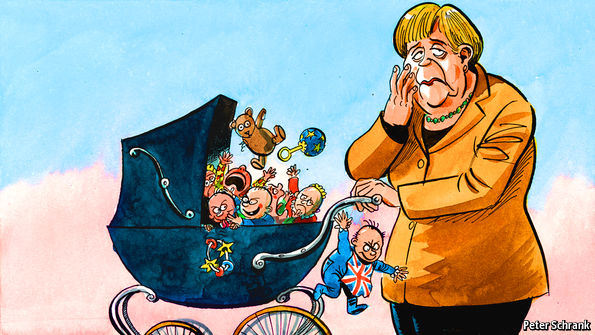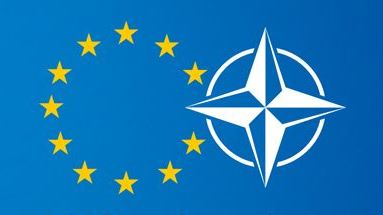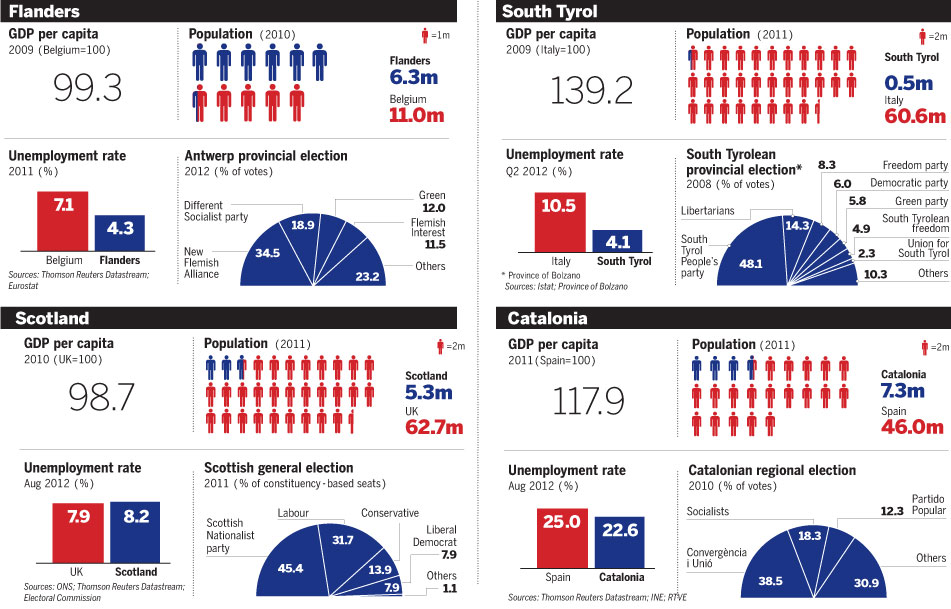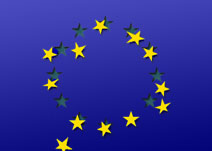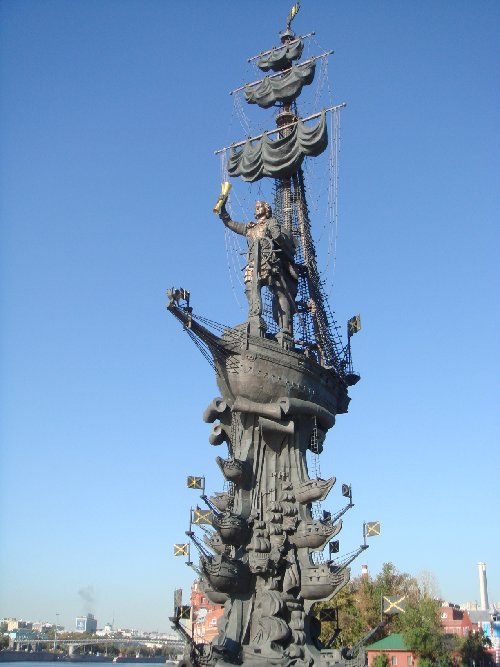
Couple of stories from WSJ and Spiegel on Russia's latest mini-bout of Westernizing fever.
It used to be that these tilts, one way or the other, went on for decades--centuries! But since Cold War's end, it seems, like everything else in this networked world, to come and go so much faster.
Yeltsin's time was an age of aping the West, then Putin led the return back to Russian-ness. Now Medvedev and others sound the age-old alarm about "falling behind the West/world" and needing to modernize once again. It's the same old Westernizers versus Slavophiles debate: Russia is a failure in its isolation and backwardness and must adopt the ways of the West versus Russia is not a failure but unique and wonderful and the champion of Slavs everywhere and we must stand up to the West and protect our brothers . . . by sucking them into our empire and putting a big wall around them!
If the last bit sounds like some modern-day Islamic radical fundamentalist impulse, it's because it is very similar. It's just an earlier version of rejecting the capitalist west.
From "Blueprint":
Last year I took my kids up to Boston, and during that trip we visited the Museum of Science. It’s a kid-oriented place, and my job was mostly to make sure my youngest son, Jerome, didn’t run off into some crowd. Near the end of the day, after the lightning show and the planetarium, we stopped by an exhibition on archaeology, where the kids got to mess around with various assembled skeletons. So while they were stacking bones in one corner, I found myself scanning the room for something to look at. I was drawn to a world map hung on a nearby wall. On it was displayed the migration of humans from our earliest origins in sub-Saharan Africa, roughly 100,000 years ago.
Now, the first thought that hit me is one that I’ve heard many times in the past: the spread of humanity around the planet was the first form of globalization. But as I stared at the timeline legend, another thought occurred to me: the spread of the current model of economic globalization is really the reverse track of that original spread of humanity. Humanity first spread from Africa to the Middle East; then to Eurasia; then to Europe, Japan, and Australia; and finally into the New World of the Western Hemisphere about 10,000 years ago. So if you were going to date civilizations, the age ranking would roughly correspond to the spread of humanity, with Africa and the Middle East being the oldest and the Western Hemisphere being the youngest.
But today’s version of globalization really began in the Western Hemisphere (the United States), then spread outward to include the West (Japan, Australia, Europe), finally conquering the Eurasian socialist bloc in the last generation, and now finding itself fundamentally stuck (no pun intended) on the oldest and least globalized parts of the world—namely, the Muslim world and Africa. In effect, modern globalization can be described as roughly a 150-year trek from the “youngest” parts of the world to the “oldest,” which is why it’s gotten harder and not easier with time, because it’s had more and more tradition and custom and history to overcome at each stage of its spread.
Admittedly, this thought didn’t come to me in a flash right then and there, because, as always, I was pretty tired from chasing my kids around that huge museum all day. What happened right there was that a different thought that had been crystallizing in my head for several days finally made sense when I saw the map. For that one, I have to take you to my nightly exercise on the treadmill, where I like to watch documentaries on my laptop.
Turns out a few days earlier I was watching Ken Burns’s masterful The Civil War, and listening to the descriptions of the conflict and what was at stake for both sides, I couldn’t help but think that the American Civil War was really the first Core-Gap war of the modern era. The North was the land of great cities, railroads, and factories, bristling with connectivity to the outside world in all forms, but especially in terms of immigrants streaming in from Europe. In contrast, the South was the bucolic, agrarian, and far more homogeneous landscape, largely disconnected from the outside world except for the narrow but voluminous trade in cotton, and distinguishable fundamentally for its heavy reliance on slave labor, which further isolated it from the rest of the world.
I know what you’re thinking: substitute oil for cotton and Asian guest workers for slaves and you’ve got some interesting parallels with a United States–led Core coalition of states seeking to transform the Middle East in another bloody war of conquest and occupation. The Union didn’t exactly invade the Confederacy to “secure” the cotton, now, did it? And the reality today is that we don’t need to invade the Persian Gulf to “secure” its oil, either. Hell, given the region’s great dependency on oil revenue, the regimes there have far fewer choices about selling their oil than the rest of the world has about buying it.
Well, it was following America’s Civil War that you really saw the second industrial revolution begin to flower in the United States, helping to speed up the westward expansion of the Union. Once the country became effectively networked with railroads, most of the movement of raw materials in our land fed the giant industrial beast rising in the northeastern quadrant of the continent. It was roughly in the last quarter of the nineteenth century, then, that the United States finally began to resemble the multinational economic and political union that it is today, with its amazingly free and efficient movement of goods, services, people, and information across dozens of states all bound together under a federal government made significantly more powerful through civil war.
Meanwhile, of course, while America was rising “peacefully” in the Western Hemisphere, Europe spent the nineteenth century expanding its vast network of colonial possessions around the world in a great race among imperial powers, giving rise to the first great modern phase of globalization (Globalization I), running roughly from 1870 through 1914. This globalization, though, was largely based on the uncompetitive movement of raw materials from the periphery (colonies) to the home world (Europe), and it was enforced primarily by the occupation of foreign lands by European nationals augmented by extensive military networks (primarily defined by navies). When that system of global economy self-destructed in two great world wars (1914–18 and 1939–45), Europe was divided between the two victorious external powers: the United States and the Soviet Union.
At that point, Western Europe was connected, along with Japan and Australia, to America’s new version of globalization (Globalization II, from 1945–80), one not based on colonialism but on free markets, free trade, transparency, democracy, and collective security. On the other side of the Yalta line, Eastern Europe was disconnected from the rest of the world and fell under the isolating control of the Soviet Union for almost half a century. When China subsequently fell to the Communists and South Asia broke free from Europe’s colonial grip, basically the rest of the Eurasian landmass was lost to the socialist mind-set, remaining largely disconnected from the West’s embryonic global economy for roughly a couple of generations.
After that period of blocked expansion, the Western-defined globalization process renewed its march eastward with the collapse of the Communist bloc in 1989, with China actually predating that conversion by several years, thanks to Deng Xiaoping’s “four modernizations” push in the early 1980s, which marked the beginning of the third great age of modern globalization (Globalization III, from 1980 to 2001). At the end of the Cold War, only the former colonial regions of the Gap, which had overwhelmingly fallen victim to homegrown authoritarian regimes after the collapse of the European empires following the Second World War, remained fundamentally outside the global economy, with the two most disconnected regions being the Middle East and sub-Saharan Africa. Not surprisingly, the Middle East now defines the battlefront in the grand historical struggle between the Core’s forces of connectedness and the Gap’s most bloodthirsty foes of that integration process (Globalization IV, from 2001), and once it likewise falls to globalization’s embrace, only deepest Africa will remain—that first cradle of humanity.
Realizing that modern globalization’s advance essentially traces backward the earlier spread of humanity is important on another level: Modern globalization’s advance has met with consistently violent resistance throughout most of its history from rejectionists armed with exclusionary ideologies. These rejectionists, starting with the slaveholding South and extending right on through to our current enemies, have always pleaded that mankind must be saved from the machine-driven logic and exploitation of the industrial world. Typically, these rejectionists not only have sought to resist integration into this industrialized world but also have proposed competing systems of government and economics that would both avoid this outcome and do it one better by leapfrogging humanity into some idealized alternative universe of near-utopian self-fulfillment.
The odd thing is that as globalization has progressively advanced in its technology and modernization, the rejectionist ideologies have been forced to retreat farther back in time to attempt to build their alternate universes. When Marxism began in the mid-nineteenth century, the assumption was that socialism would naturally be achieved at capitalism’s pinnacle of development, or at the point of the superabundance of goods. This ideology actually sought to extend the capitalist model of development beyond what were perceived as its logical limits. But since that ideology proved wrong in its diagnosis of capitalism’s weaknesses, it fell to Vladimir Lenin to turn Marx on his head at the start of the twentieth century and argue that socialist revolution was far more likely to succeed in a largely precapitalist society, meaning not industrial Germany but Russia just as it was approaching what would have been its industrial phase of development.
Later in the same century, Lenin’s great ideological successor, Mao Zedong, took his theory farther back in time, arguing that socialist revolutions made even more sense in largely agrarian societies like China, meaning a revolution led by rural peasants and not by an urban proletariat. Cambodia’s subsequent Khmer Rouge Communist movement later took Mao’s ideology to its logical extreme, not just engaging in “cultural revolution” against largely city-based “enemies of the state” but literally emptying the cities and forcing millions to endure “reeducation” (marking the revolutionary Year Zero that would reboot the system completely) and eventual genocide in the most backward rural areas of the country.
Meanwhile, with the fall of the Portuguese empire in sub-Saharan Africa in the mid-1970s, the Soviet Union’s leadership, despite the complete lack of revolutionary spirit back home, nonetheless deluded itself into thinking that successful socialist states could be constructed in some of Africa’s most backward economies, generating Moscow’s brief but ultimately failed ideological fling with the so-called Countries of Socialist Orientation (e.g., Angola, Mozambique, Ethiopia). When the bankruptcy of that approach was made apparent in the failure of the Soviet puppet regime in Afghanistan at the beginning of the 1980s, the great collapse of the socialist bloc began in earnest, fueled in Asia by China’s rapid turn toward market economics under Deng.
It was at this point in history that many political theorists began speaking of the “end of history,” a phrase made famous by philosopher Francis Fukuyama, who, not accidentally, began his career as an expert on the Soviet bloc and its relations with the Third World (the subject of my Ph.D. dissertation as well). What was meant by that was the notion that no feasible alternative to democracies and capitalism seemed to exist anymore, signaling the historical supremacy of each in combination. As a great wave of democratization swept the planet in the wake of the socialist bloc’s retreat and collapse, the judgment appeared warranted.
And in many ways this historical judgment does remain valid, for what has arisen in the years since the Cold War cannot be described as a full-fledged alternative model of development, since the Salafi jihadist movement promises no economic development whatsoever, but rather a strange sort of retreat into the past, with the utopian promise of somehow not only getting it right this time (i.e., returning to the golden age of the first several centuries following Muhammad’s life), but doing so in such a way as to become far superior to the current perceived alternative (“Westoxification” at the hands of a corrupt capitalist world system). Indeed, the world witnessed this back-to-the-future outcome in the Taliban’s rule in Afghanistan across the late 1990s, right down to its pointless destruction of all symbols of foreign religions, the banning of television and music, and severe restrictions on the education of females (the quintessential disconnect). In all, the Taliban’s definition of the “good life” was almost prehistorical in its quality, demonstrating the absurd lengths to which the violent resistance to globalization has traveled in the current age.
Yet, despite this retreat into the past, which corresponds to globalization’s progressive encroachment into the world’s most ancient civilizations, the Salafi jihadist movement of today is, in the words of economist Brink Lindsey, “strikingly similar to its defunct, secular cousins.” For like all the Lenins and Maos before it, al Qaeda’s antiglobalization movement, while feeding off its adherents’ sense of alienation from, and resentment of, the Western-fueled globalization process, is still nothing more than a naked grab for power over others, or what Lindsey calls “the millennial fantasy of a totalitarian state that is the fundamental feature and common thread that unites all the radical movements of the Industrial Counterrevolution.”
But, unlike previous versions of ideological resistance to this expanding model of global economic connectivity such as socialism or fascism, which offered a marriage of conservative social values with modern technology, the Salafi jihadists promise simply the rejection of modernity—which, as Lindsey points out, effectively kills any sort of global appeal beyond their most like-minded coreligionists. So how can bin Laden and al Qaeda still maintain their widespread popularity in the Islamic world? Easy. Their main competition is the rigid, unimaginative authoritarianism that grips so much of the Middle East. With history “ended,” where else can young Muslims turn in their anger over the lack of both freedom and development in their countries?
You know, one of the things I like about the Wikistrat globalization model that we're building right now, is that we're using bits and pieces from the books like this to illustrate points and aspects of the model, so we're doing exactly what this Civil Affairs officer at Monterey asked if I could someday do: create an online space where people could come and really immerse themselves in the ideas but have them framed and accessible around an ongoing exploration of globalization.
Anyway, I give you the clip there to illustrate: Bolshevism & Marxism-Leninism was just a time-phase variant of the anti-capitalist/anti-globalization response that's existed throughout history (the clip, if I had extended it, would have gone into Occidentalism, or hatred of the West/modernity), but it was also a natural variant of the Russian relationship with the wider world.
Russia, not unlike big chunks of the Middle East, is a tough place to live with the harsh winters and such. So the code and rule sets there were strict about conformity, collectivism, and so on. And outsiders were largely shunned in the early formative days of that civilization.
When the West begins to make itself known, it is, by comparison, an opportunity for enrichment--if Russians are willing to change themselves and integrate. This is a huge choice, and a frightening one. To do it means to abandon a lot of the past rules and identity and that usually only is possible when you feel those rules and traditions have been radically trumped. So it feels like surrender to the alien outsiders: me bad, you good, me want to be like you!
Not easy stuff to swallow. Naturally, such perceived self-abasement triggers an opposing emotion: me not bad, you really bad, me actually unique and better and I need to act on that and make my world that much bigger and stronger and secure to keep you and your bad influences out!
That's basically the inner dialogue of the Westernizers and Slavophiles, and it's been going on for centuries, with the first great turn West coming under Peter the Great.
Well, Russia, after its bout with "restoration of power" under Putin, now suddenly feels like it's a commodities producer with nothing else to offer the world. Maybe not Upper Volta with nukes but not much better than Iran--soon enough. So, when Medvedev and Putin do their little dance about who gets to be president next, the old debate resurfaces, with Medvedev as the latest Westernizing siren.
Medvedev has said, in effect: we are not a modern country and we need to become one in this globalized age. We need to get closer to Europe--not pull away or be nasty over natural gas. And we need to use these contacts to learn better their ways and make ourselves more like them.
The underlying current of the Westernizers has always been, "Because going the other route and becoming more Asian really sucks!"
Putin had his time to emulate the Chinese, but the Russians, deep down, feel more European than Asia--always have and always will. They admire and hate Europe, but they despise the Chinese. Chalk it up to whatever, but that undercurrent is always there, by my estimation.
So the WSJ story talks about a big privatization plan the Russians are pursuing ($59B) "as the Kremlin seeks to cut the state's role in the economy and raise money to balance the budget."
Doesn't mean their version of state-dominated big-firm capitalism goes away tomorrow; just means they know it's not the future. Living as a commodities producer just isn't a way to grow yourself, so the effort is back on to convince Western (and Eastern) investors that Russia can be made safe--once again--for investment.
Second story from Spiegel speaks to a subject near to my heart for almost two decades: Russia should join NATO. Not just have close or better relations; it should join NATO.
Putin by contrast had attacked the "almost uncontained hyper-use of military force" by NATO and the US in his famous speech to the Munich Security Conference in 2007 in which he warned that Russia had weapons systems that could get through Washington's planned missile shield, designed primarily to intercept missiles from Iran.
Under Medvedev, by contrast, the Kremlin appears ready even to contemplate Russia joining NATO one day. The Institute for Contemporary Development, whose board of trustees is headed by Medvedev, called in a strategy paper for Russia to integrate itself into NATO.
Now, everybody says that would "destroy" NATO's identity, but that's a past identity. What NATO is today is undersubscribed (a point I made yesterday in the Global Political Trends on the Wikistrat model): it's the closest thing we have to a Core-wide military alliance and it has too few members for its legacy sense of responsibility. It simply needs to grow, and Russia's an obvious next target. Not the Ukraine or Georgia BEFORE Russia, but Russia and perhaps those to soon follow.
As always, this kind of forward thinking is considered too naive, too out there, too whatever. But compared to NATO's efforts to make Afghanistan work without Russian (and other) help, I think the idea is pretty sane.
We'll keep doing it the hard way because that's what our "wise men" know from their past--along with their trained next-generation acolytes. But eventually, new minds come along and what is "inconceivable!" (in that Princess Bride way) suddenly becomes reasonable.
Is this the last go-around on the Westernizer-Slavophile merry-go-round? I would never say never on that.
But eventually, yeah, it will stick--if Europe is smart enough to make the deal.
 Saturday, August 27, 2016 at 7:59PM
Saturday, August 27, 2016 at 7:59PM 